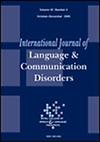‘Can be challenging but usually worth it!’: International survey of rehabilitation professionals' experiences of social media use after acquired brain injury
Abstract
Background
People with an acquired brain injury (ABI) can struggle to use social media after their injury, due to changes in their cognitive-communication skills, and would like help to improve their skills and connectivity. A focus group study in one Australian brain injury rehabilitation service recently found that ABI rehabilitation professionals are restrictive or reactive (rather than proactive) in their approach to supporting people in using social media after an ABI; however, it is unknown whether this finding reflects practice internationally.
Aim
To survey a larger international cohort of rehabilitation professionals working with people after ABI to understand their views and experiences of social media use after ABI and to explore ways of addressing social media use during rehabilitation.
Methods and Procedures
Participants were recruited via social media posts and email invitations between July 2020 and July 2022 to complete an online survey of 27 questions across three categories, ‘Demographic Information’ (5 questions), ‘Own social media use’ (12 questions), and ‘Perspectives on social media use after ABI’ (10 questions). Directed content analysis was used to explore and interpret the data.
Results
Of the 83 rehabilitation professionals who responded to the survey, 68 data sets met eligibility criteria for analysis. Most respondents were aged between 25 and 55 years (86%), and practiced across Australia (53%), the United Kingdom (24%), the United States (16%), Canada (3%), the European Union (3%) and Asia (1%). Most were speech pathologists (68%), occupational therapists (9%) or clinical neuropsychologists (7%). The mean length of experience working with people with ABI was 14.3 years (SD = 10.6). Participants identified benefits in social media use during ABI rehabilitation for social connection and inclusion, whilst also highlighting the risks and their own limitations in knowledge and expertise. Clinical guidance, policy, funding and resources were recommended to support clinicians to successfully address social media goals during rehabilitation.
Conclusion
Rehabilitation professionals recommend that social media use be routinely considered during rehabilitation after ABI and report that they need greater access to knowledge, expertise, resources and policy to support this in clinical practice. Addressing social media goals in rehabilitation was reported to be complex and challenging yet rewarding for all involved. Ongoing robust research is urgently required to give rehabilitation professionals an evidence-based framework and resources for assessment and intervention in this space.
WHAT THIS PAPER ADDS
What is already known on the subject
- People with an acquired brain injury (ABI) experience challenges in using social media safely and meaningfully after their injury. With little guidance available to support clinical practice, ABI rehabilitation clinicians feel uncertain in their approach to addressing social media goals and want greater access to knowledge, expertise and resources.
What this paper adds to existing knowledge
- This paper provides confirmation of previous work exploring how social media is addressed during rehabilitation and extends on our knowledge through surveying a larger cohort of international ABI rehabilitation professionals. Rehabilitation professionals report that inclusion in online communities is now central to many people's social and occupational endeavours and recommend that social media use be routinely considered during rehabilitation after ABI. When incorporating the use of social media into rehabilitation, clinicians report positive outcomes despite the complexity and challenges faced in doing so.
What are the potential or actual clinical implications of this work?
- Respondents in this study suggested potential approaches and strategies for rehabilitation professionals to consider when supporting social media use after ABI. However, ongoing robust research is urgently required to give rehabilitation professionals an evidence-based framework and resources for assessment and intervention of social media communication skills after brain injury.

 求助内容:
求助内容: 应助结果提醒方式:
应助结果提醒方式:


